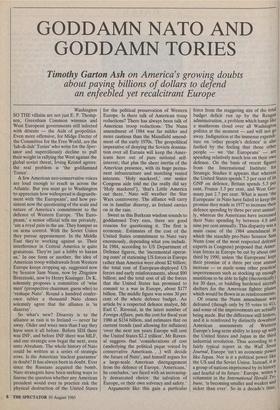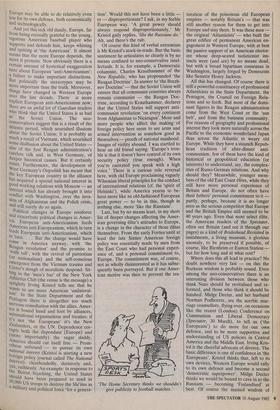GODDAMN NATO AND GODDAMN TORIES
Timothy Garton Ash on America's growing doubts
about paying billions of dollars to defend an enfeebled yet recalcitrant Europe
Washington SO THE villains are not just E. P. Thomp- son, Greenham Common wimmin and West European governments still infected with détente — the Aids of geopolitics. Even more offensive, for Midge Decter of the Committee for the Free World, are the 'lah-di-dah' Tories' who write for the Spec- tator and superciliously decline to pull their weight in rallying the West against the global soviet threat, Irving Kristol agrees: the real problem is 'the goddamned Tories'.
A few American neo-conservative voices are loud enough to reach us across the Atlantic. But you must go to Washington to appreciate how widespread is disgruntle- ment with 'the Europeans', and how per- sistent now the questioning of the scale and nature of America's commitment to the defence of Western Europe. 'The Euro- peans,' a senior official tells me privately, `are a royal pain in the ass. They hamper us on arms control. With the Soviet Union they pursue appeasement. In the Middle East they're working against us. Their interference in Central America is quite gratuitous. They're just a lobby to harass us.' In one form or another, the idea of American troop withdrawals from Western Europe keeps cropping up, suggested now by Senator Sam Nunn, now by Zbigniew Brzezinski, now by Henry Kissinger. Dr K. solemnly proposes a committee of 'wise men' (prospective chairman: guess who) to `reshape Nato'. Round a hundred confer- ence tables a thousand Nato clones solemnly agree that the alliance is in disarray'.
So what's new? Disarray is to the alliance as rain is to Ireland — never far away. Older and wiser men than I say they have seen it all before. Before SDI there was INF, and before INF there was MLF, and one strategic row begat the next, even unto Abraham. The whole history of Nato could be written as a series of strategic rows. Is the American 'nuclear guarantee' in doubt? It has always been in doubt. Ever since the Russians acquired the bomb, Nato strategists have been seeking ways to finesse the question whether any American president would ever in practice risk the physical destruction of the United States for the political preservation of Western Europe. Is there talk of American troop reductions? There has always been talk of American troop reductions. The Nunn amendment of 1984 was far milder and more cautious than the Mansfield amend- ment of the early 1970s. The geopolitical imperative of denying the Soviets domina- tion over all Eurasia will keep the Amer- icans here out of pure national self- interest; that plus the sheer inertia of the American presence, with its huge perma- nent infrastructure and matching vested interests. 'Holy mackerel,' one senior -Congress aide told me (he really did say `Holy mackerel'), 'that's Little America out there.' Nato will weather the Star Wars controversy. The alliance will carry on in familiar disarray, as Ireland carries on in the rain.
Sweet as this Burkean wisdom sounds to goddamned Tory ears, there are good reasons for questioning it. The first is economic. Estimates of the cost of the United States commitment to Nato vary enormously, depending what you include. In 1984, according to US Department of Defence figures, the 'incremental operat- ing costs' of stationing US forces in Europe rather than America were about $2 billion; the total cost of European-deployed US forces and early reinforcements, about $90 billion; and the total cost of all the forces that the United States has promised to commit to a war in Europe, about $177 billion. The middle figure was some 30 per cent of the whole defence budget. An article by a respected defence analyst, Mr Earl C. Ravenal, in the latest number of Foreign Affairs, puts the cost for fiscal year 1986 at $134 billion, and estimates that on current trends (and allowing for inflation) `over the next ten years Europe will cost the United States $2.2 trillion'. Mr Raven- al suggests that 'considerations of cost (underlying the political pique voiced by conservative Americans. . .) will decide the future of Nato', and himself argues for a large-scale American disengagement from the defence of Europe. 'Americans,' he concludes, 'are faced with an increasing- ly demarcated choice: the salvation of Europe, or their own solvency and safety.'
Arguments like this gain a particular force from the staggering size of the total budget deficit run up by the Reagan administration, a problem which hangs like a mushroom cloud over all Washington politics at the moment — and will not go away. Indignation at the immense expendi- ture on 'other people's defence' is also fuelled by the feeling that those other people — we 'the Europeans' — are spending relatively much less on their own defence. On the basis of recent figures from the International Institute for Strategic Studies it appears that whereas the United States spends 7.3 per cent of its GNP on defence, Britain spends 5.3 per cent, France 3.3 per cent, and West Ger- many just 2.7 per cent. What is more 'the Europeans' in Nato have failed to keep the promise they made in 1977 to increase their defence spending by three per cent annual- ly, whereas the Americans have increased their Nato spending by between 4.9 and nine per cent annually. This disparity was, a main cause of the 1984 amendment In which the stanchly pro-Nato Senator Sant Nunn (one of the most respected defence experts in Congress) proposed that Amer- ican forces in Europe be cut by about one third by 1990, unless 'the Europeans' kept their promise of a three per cent annual increase — or made some other practical improvements such as stocking up enough munitions to be able to fight (theoretically) for 30 days, or building hardened aircraft shelters for the American fighter planes which would be flown in as reinforcements.
Of course the Nunn amendment was defeated (though only by 55 votes to 41), and some of the improvements are actually being made. But the difference still festers, and it is reinforced by distinctly downbeat American assessments of Western Europe's long-term ability to keep up with the United States and Japan in the third industrial revolution. Thus according to a fairly typical report in the Wall Street Journal, Europe 'isn't an economic power like Japan. Nor is it a political power like i the US and the Soviet Union. Instead, it s a group of nations imprisoned by its history and fearful of its future.' Europe, writes a columnist in the International Herald Tri- bune, 'is becoming smaller and weaker and sicker than ever'. So in a decade's time, Europe may be able to do relatively even less for its own defence, both economically and technologically. And yet this sick old dandy, Europe, far from being eternally grateful to the young, vigorous American baseball player who supports and defends him, keeps whining and spitting at 'the Americans'. It almost seems that the more Europe depends, the more it protests. Now obviously there is a certain amount of hysterical exaggeration here about European 'anti-Americanise; a failure to make important distinctions. But politically the stereotypes may be more important than the truth. Moreover, things have changed in Western Europe over the last decade. There is more explicit European anti-Americanism now; there are an awful lot of Guardian readers who think that the United States is as bad as the Soviet Union. The neo- conservatives suggest this is a result of the detente period, which nourished illusions about the Soviet Union; it is probably as much a result of Vietnam, which nourished some disillusion about the United States also of the first Reagan administration's careless talk and, in West Germany, of deeper historical causes. But it certainly exists. Furthermore, the development of West Germany's Ostpolitik has meant that the key European country in the alliance has acquired a special national interest in good working relations with Moscow — an interest which has already brought it into conflict with Washington, over the inva- sion of Afghanistan and the Polish crisis, and will surely do so again. Political changes in Europe reinforce and exacerbate political changes in Amer- ica. European anti-Americanism feeds American anti-Europeanism, which in turn feeds European anti-Americanism, which at turn. . . . But the change would have come in America anyway, with 'the Reagan revolution' and the promise to walk tall', with the revival of patriotism (or nationalism) and the self-conscious emergence from the Vietnam trauma and Carter's slough of moralistic despond. Sit- ting in the `men's bar' of the New York Athletics Club (the venue is the message) a sPnghtly Irving Kristol tells me that he Wants to see more American 'unilateral- ism'. In the State Department and the. Pentagon there is altogether too much nervous consultation with the allies. Amer- ica is bound hand and foot by alliances, international organisations and treaties: if s not 'the Europeans' it's the New Zealanders, or the UN. Dependence cor- rupts both the dependant (Europe) and (more importantly) the sugar daddy. America should cut itself free — Prom- etheus unbound — to pursue its own national interest (Kristol is starting a new foreign policy journal called The National Interest), clearheadedly, decisively and, Yes, ruthlessly. An example: in response to the Beirut hijacking, the United States should have been prepared to send in 30,000 US troops to destroy the Shi'ites as a military and political force 'for a genera- tion'. Would this not have been a little — er — disproportionate? I ask, in my feeble European way. 'A great power should always respond disproportionately,' Mr Kristol gaily replies, 'like the Russians do.' Ah, and there's the rub.
Of course this kind of verbal extremism is Mr Kristol's stock-in-trade. But the basic sentiment he articulates so clearly is by no means confined to neo-conservative intel- lectuals. It is, for example, a Democratic columnist, Charles Krauthammer of the New Republic, who has propounded 'the Reagan Doctrine'. In answer to 'the Brezh- nev Doctrine' — that the Soviet Union will ensure that all communist countries always remain communist — the Reagan Doc- trine, according to Krauthammer, declares that the United States will support anti- communist revolution 'on every continent from Afghanistan to Nicaragua'. More and more people who affect the making of foreign policy here seem to see arms and armed intervention as somehow good in themselves — proofs of national manhood. Images of virility abound. I was startled to hear an old friend saying: 'Europe's trou- ble is that it doesn't have control of its own security policy (true enough). When you're castrated you speak with a high voice.' There is a curious role reversal here, with old Europe proclaiming vaguely Wilsonian liberal principles for the conduct of international relations (cf. the 'spirit of Helsinki'), while America yearns to be- have more like an old-fashioned European great power — to be in this, though in nothing else, more 'like the Russians'. Last, but by no means least, in my short list of deeper changes affecting the Amer- ican governing elite's attitudes to Europe, is a change in the character of those elites themselves. From the early Forties until at least the late Sixties American foreign policy was essentially made by men from the East Coast who had personal experi- ence of, and a personal commitment to, Europe. The commitment was, of course, not as wholly disinterested as it has subse- quently been portrayed. But if one Amer- ican motive was then to prevent the res- The Home Secretary thinks we shouldn't give publicity to football matches.' toration of the poisonous old European empires — notably Britain's — that was still another reason for them to get into Europe and stay there. It was these men the original 'Atlanticists' — who built the great edifice of permanent American en- gagement in Western Europe, with at best the passive support of an American elector- ate whose deep-seated isolationist ins- tincts were (and are) by no means dead, but with a broad bipartisan consensus in Washington, largely forged by Democrats like Senator Henry Jackson.
All this has changed. Of course there is still a powerful constituency of professional Atlanticists in the State Department, the Pentagon, the Council on Foreign Rela- tions and so forth. But most of the domi- nant figures in the Reagan administration come from the West Coast or the `sun belt', and from the business community. For reasons of geography and professional interest they look more naturally across the Pacific to the economic wonderland Japan than across the Atlantic to weary old Europe. While they have a staunch Repub- lican tradition of after-dinner anti- communism, few of them have the kind of historical or geopolitical education (or interests) to understand, say, the complex- ities of Russo-German relations. And why should they? Meanwhile, younger mem- bers of the old East Coast elites, while they still have more personal experience of Britain and Europe, do not often have their fathers' personal commitment to it — partly, perhaps, because it is no longer seen as the serious competitor that Europe and the British Empire still seemed to be 40 years ago. Even that most select elite, the American readers of the Spectator, often see Britain (and see it through our pages) as a kind of Brideshead Revisited in instalments, a living museum, a glorious anomaly, to be preserved if possible, of course, like Blenheim or Euston Station but for how long and at what cost?
Where does this all lead in practice? No doubt nowhere very fast — on this the Burkean wisdom is probably sound. Even among the neo-conservatives there is an interesting division between those who think Nato should be revitalised and re- formed, and those who think it should be finished. Midge Decter, and her husband Norman Podhoretz, are the acerbic mar- riage counsellors, flying over, on occasions like the recent (London) Conference on Communism and Liberal Democracy (Spectator, 30 March), to tell us (Vie Europeans') to do more for our own defence, and to be more supportive and understanding of US policies in Central America and the Middle East. Irving Kris- tol is the cheerful advocate of divorce. The basic difference is one of confidence in 'the Europeans'. Kristol thinks that, left to its own devices, Western Europe would rally to its own defence and become a second `democratic superpower'. Midge Decter thinks we would be bound to cave in to the Russians — becoming 'Finlandised' at best. Of course the massed wisdom of foreign policy establishments on both sides of the Atlantic is in favour of marriage counselling rather than divorce. But it would certainly be very foolish of any European government to ignore the possi- bility of divorce in its long-term thinking about defence and foreign policy. Kristol may play the part of ideological court jester. But jesters often speak more truly than kings.
There is also, perhaps, a special footnote for the British. One of the myths with which we cushioned the loss of Empire was that of our 'special relationship' with the United States. Perhaps there was once a hard political reality behind the myth (as well as the lasting cultural reality of shared language and values). But if anyone still seriously believes — as Mrs Thatcher sometimes appears to believe — that there is much substance to the 'special rela- tionship' on the major issues of foreign and defence policy, then they need to spend a little more time in Washington. We may still have the firm impression that we are, so to speak, not Germans. But viewed from Washington — let alone from Califor- nia — these fine distinctions have become almost invisible. British or Germans, peaceniks of 'lah-di-dah' Tories, P. Wors- thorne or E. P. Thompson, like it or not, we are all 'Europeans' now.












































 Previous page
Previous page